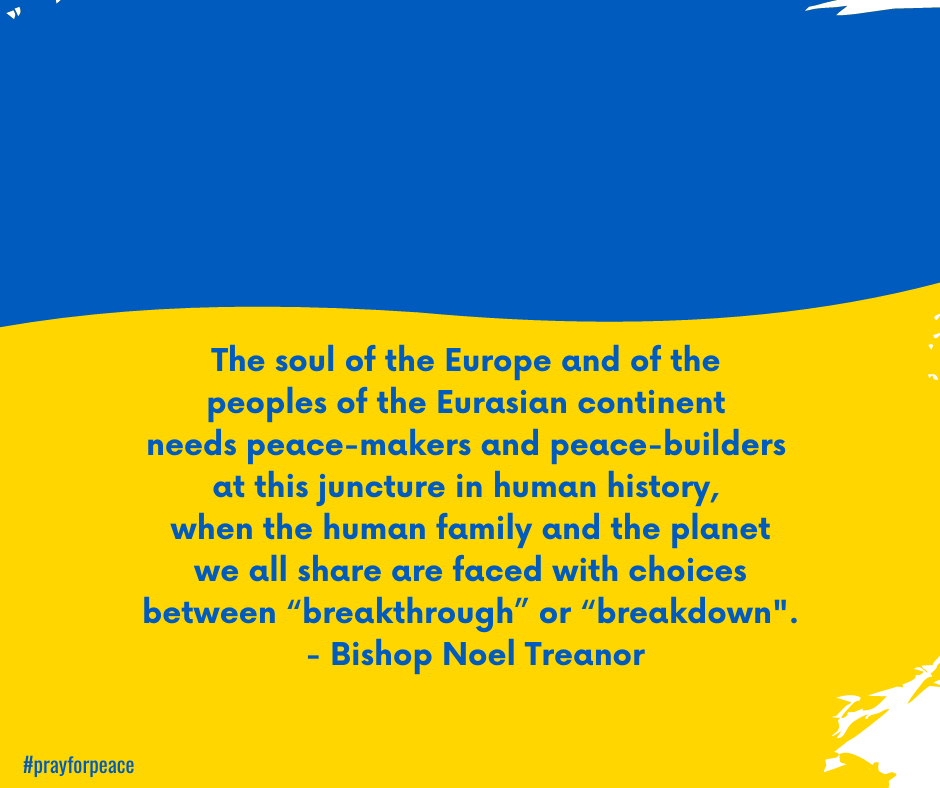“How are we and all Christians in Europe to receive the Word of God on this Sunday, when aggression and war have broken out in Ukraine, on European soil?” This was the question posed by Bishop Noel Treanor in his homily on Sunday 27 February in Saint Pater’s Cathedral Belfast.
Bishop Treanor continued, “Despite the lessons learned at such a high price from the wars of the twentieth century and the courageous efforts to create and establish new political institutions in Europe, in these last days we have seen that history repeats itself, if we do not learn its lessons and hand them on from generation to generation.
“Untamed “interests” – the drive to power, to unregulated political, financial and economic domination – which are ever at play in the human condition, can become destructive, if they are not regulated and ordered to the acceptance and pursuit of the common good : in the words of the first reading from the book of Ecclesiasticus, the kiln of history “tests the work of the potter”.
“We citizens, and our leaders especially, are responsible for the shaping of history : all together of us together the custodians and guardians of the kiln of history.”
Bishop Treanor went on to say, “From the ruins, destruction and human horror of the two World Wars in the first half of the twentieth century, there emerged a voice of wisdom and a determination, a dynamic of spiritual renewal, to put an end to war on our continent.
“The Zurich and Strasbourg speeches of Winston Churchill, the writings, ideas and initiatives of political leaders, such as Robert Schuman, Jean Monnet, Alcide de Gasperi, Henri Spaak and many others are known to us. Their writings are easily accessible and are ever pertinent. With countless women and men, civil servants, politicians, diplomats, they established European institutions such as, the Council of Europe, the OSCE, and particularly the institutions of the European Union, with its new and singular institutional architecture and community method. The foundational spirit and central idea of these institutions was to secure peace for the people of Europe and to develop the economic, social and cultural foundations to maintain it into the future. It has been a remarkably successful endeavour. This is not to claim that it is perfect, though we must beware of slaying the good on the altar of perfection.”
Bishop Treanor continued, “And now, despite the good work invested in the Neighbourhood Policies of the EU over many years, war has broken out on the eastern frontier of the EU, just a few hours distant from us by plane.
“How can this be? What does this development – which so many citizens in all countries, Russia included, do not understand – say about our international relations, the ethos of the institutions that serve them and the public narrative on human values in our societies and their education systems? Was something vital lacking? Have we and our political institutions tended the soul of Europe, of our political and diplomatic endeavours? These are questions which the current Conference on the Future of Europe must now explore with renewed verve, perhaps removing “the speck from our own eye first” (Lk 6. 42), to cite the text from the gospel extract to which we have listened.
“Our hearts and our prayers go out to the people of Ukraine and to all those who in Russia are calling for a cessation of this aggression and for peace. The countless thousands who gather in city and town squares around the world are in tune with the sentiments of the Responsorial Psalm (Ps 91/92) as they call for peace and a ceasefire.
“As we listen to the Word of God today and celebrate the Eucharist, I am sure we wish to raise your voices in support of a call to President Vladimir Putin to stop this war and withdraw his forces from the Ukraine. As followers of Jesus Christ, I am sure you wish to appeal with me to His Holiness Kirill, the Patriarch of Moscow and all Russ, to do all in his power to prevail upon the political authorities to end this war and violation of international law.”
Concluding his homily Bishop Treanor said, “The soul of the Europe and of the peoples of the Eurasian continent needs peace-makers and peace-builders at this juncture in human history, when the human family and the planet we all share are faced with choices between “breakthrough” or “breakdown”, as some have put it. It is those who are the architects of a spiritual “breakthrough,” ensuring peace and justice for all peoples, who will shine in historical memory and among the saints of all traditions.
“So, as we receive the Word of God today, remembering in our prayers all victims of this unjustifiable aggression and war against the Ukraine, we join our voices to that of Pope Francis – who has called us to a day of Fasting and Prayer on Ash Wednesday for peace for the people of Ukraine – and to the calls of Church and Faith leaders throughout the world as we pray for peace and also for all who bear and share political responsibility – that they may walk and lead us all in the way of peace.”
Bishop Noel Treanor is Bishop of Down and Connor and Delegate of the Irish Bishops’ Conference to COMECE (Commission of the Bishops’ Conferences of the European Community) since 2009.
ENDS


